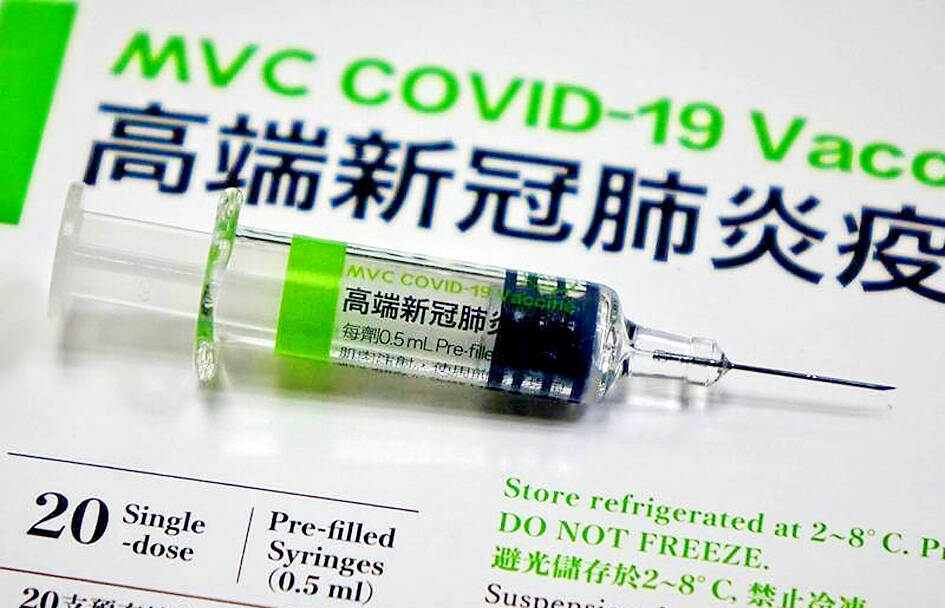Taiwan’s indigenously developed Medigen COVID-19 vaccine is as effective in preventing deaths and serious symptoms as mRNA shots, a study to be published in the US Centers for Disease Control and Prevention’s journal next month showed.
An early release of the study is available on the Web site of the Emerging Infectious Diseases journal.
The study, conducted by the Centers for Disease and Control (CDC), utilized data from Taiwan’s records of inoculations, hospitalizations and deaths since the local outbreak of the Omicron variant of SARS-CoV-2 in 2022.

Photo: Taipei Times
CDC Deputy Director-General Philip Lo (羅一鈞) said that the protein subunit-based Medigen vaccine had an effectiveness of 91 percent after three jabs.
The mRNA-based BioNTech and Moderna vaccines were 95.8 and 81 percent effective after three jabs respectively, while the viral vector-based AstraZeneca vaccine was 65.7 percent effective, Lo said.
The CDC study also found that Medigen and mRNA jabs had a longer efficacy period than the AstraZeneca vaccine, he said.
The research is the world’s first big data study on the efficacy of mRNA, protein-subunit and viral-vector COVID-19 vaccines that draw from real-world outcomes, he said, adding that the findings might boost the development of new protein-subunit vaccines, including Novavax.
The study vindicates the Medigen vaccine, which was unfairly criticized in the nation, Premier Chen Chien-jen (陳建仁) told an event marking the inking of a strategic alliance between Taiwan Bio-Manufacturing Corp (台灣生物醫藥製造) and US-based National Resilience Inc.
Taiwan handled its local outbreak with a conventional strategy, which proved successful in containing the virus’ spread and protecting economic growth, he said, adding that the nation has received international accolades for its accomplishment.
The COVID-19 pandemic showed that having pharmaceutical research capability without an industrial base to manufacture medicines at scale would not be enough to meet Taiwan’s needs, National Development Council Minister Kung Ming-hsin (龔明鑫) said.
The ability to mass produce medical drugs is crucial to public health as well as national security, but the nation’s NT$1 trillion (US$32.01 billion) biomedical industry has an undersized NT$700 billion to NT$800 billion manufacturing sector, he said.
Separately yesterday, Lo said that the CDC had delivered the last 156,000 Novavax XBB doses in its inventory to local governments.
The number of available Moderna and Novavax XBB vaccine doses stood at 459.2 million and 315,000 respectively, he said.
COVID-19 continues to circulate, with 52 percent of cases now being the JN.1 variant, Lo said, adding that XBB vaccines are about 50 percent effective against mild symptoms in adults.
The CDC urged the public to get inoculated ahead of the Lunar New Year holiday, which begins next week.
People older than 12 can get either type of the XXB vaccine, while children under that age can only receive Moderna’s version, it said.
Information about vaccination locations can be found online at: https://gov.tw/eU4.
Additional reporting by CNA

AGING: As of last month, people aged 65 or older accounted for 20.06 percent of the total population and the number of couples who got married fell by 18,685 from 2024 Taiwan has surpassed South Korea as the country least willing to have children, with an annual crude birthrate of 4.62 per 1,000 people, Ministry of the Interior data showed yesterday. The nation was previously ranked the second-lowest country in terms of total fertility rate, or the average number of children a woman has in her lifetime. However, South Korea’s fertility rate began to recover from 2023, with total fertility rate rising from 0.72 and estimated to reach 0.82 to 0.85 by last year, and the crude birthrate projected at 6.7 per 1,000 people. Japan’s crude birthrate was projected to fall below six,

US President Donald Trump in an interview with the New York Times published on Thursday said that “it’s up to” Chinese President Xi Jinping (習近平) what China does on Taiwan, but that he would be “very unhappy” with a change in the “status quo.” “He [Xi] considers it to be a part of China, and that’s up to him what he’s going to be doing, but I’ve expressed to him that I would be very unhappy if he did that, and I don’t think he’ll do that. I hope he doesn’t do that,” Trump said. Trump made the comments in the context

SELF-DEFENSE: Tokyo has accelerated its spending goal and its defense minister said the nation needs to discuss whether it should develop nuclear-powered submarines China is ramping up objections to what it sees as Japan’s desire to acquire nuclear weapons, despite Tokyo’s longstanding renunciation of such arms, deepening another fissure in the two neighbors’ increasingly tense ties. In what appears to be a concerted effort, China’s foreign and defense ministries issued statements on Thursday condemning alleged remilitarism efforts by Tokyo. The remarks came as two of the country’s top think tanks jointly issued a 29-page report framing actions by “right-wing forces” in Japan as posing a “serious threat” to world peace. While that report did not define “right-wing forces,” the Chinese Ministry of Foreign Affairs was

PREPAREDNESS: Given the difficulty of importing ammunition during wartime, the Ministry of National Defense said it would prioritize ‘coproduction’ partnerships A newly formed unit of the Marine Corps tasked with land-based security operations has recently replaced its aging, domestically produced rifles with more advanced, US-made M4A1 rifles, a source said yesterday. The unnamed source familiar with the matter said the First Security Battalion of the Marine Corps’ Air Defense and Base Guard Group has replaced its older T65K2 rifles, which have been in service since the late 1980s, with the newly received M4A1s. The source did not say exactly when the upgrade took place or how many M4A1s were issued to the battalion. The confirmation came after Chinese-language media reported